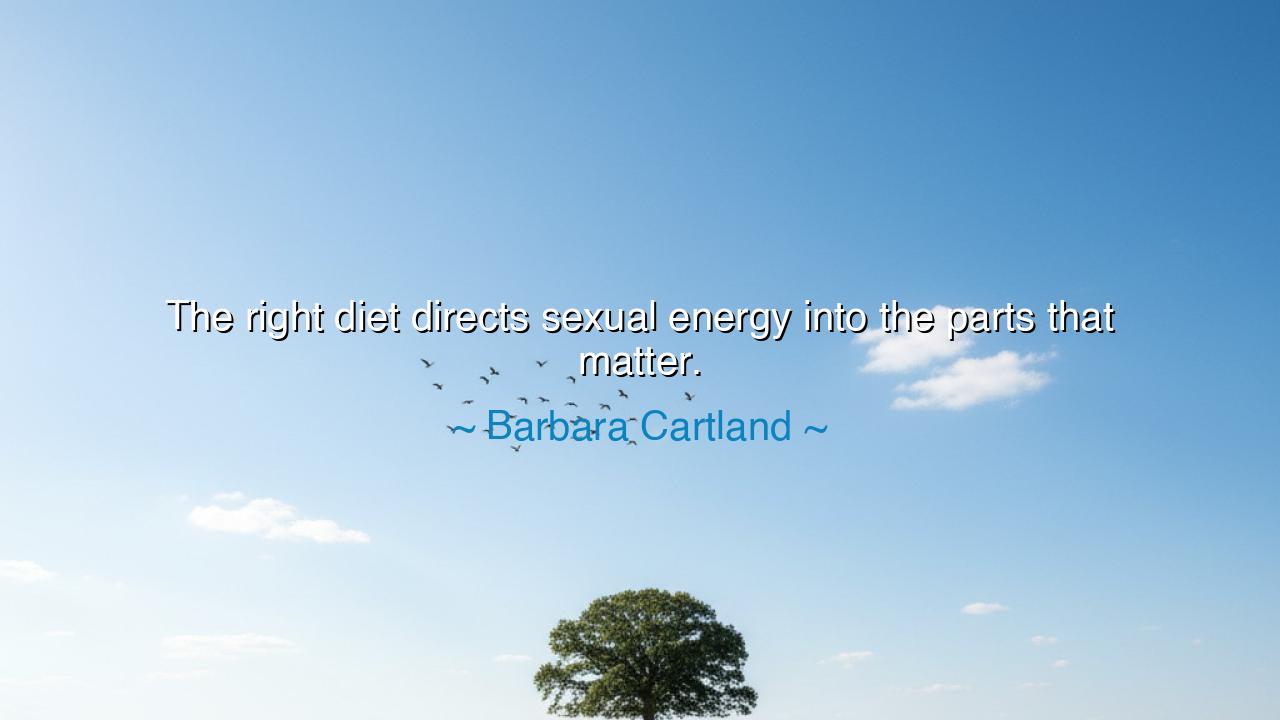
The right diet directs sexual energy into the parts that matter.






"The right diet directs sexual energy into the parts that matter." These words, spoken by Barbara Cartland, are not simply about food, but about the deeper connection between what we consume and how we channel the vital energies of our bodies. In the ancient world, the relationship between diet and sexual energy was seen as a reflection of the balance between the physical, mental, and spiritual realms. To the ancients, the body was not merely a vessel, but a conduit for the forces of life—and how one nurtured it with food and lifestyle determined not just health, but the very quality of one's vitality and passion.
In the teachings of Hippocrates, the father of modern medicine, the idea of nourishing the body was intimately tied to understanding how food affected the mind and spirit. Hippocrates saw food as a form of medicine, capable of healing or harming the body’s natural balance. He understood that diet was not a mere tool for sustenance, but a means to channel the body’s energies for greater purposes. Cartland's insight into directing sexual energy through a balanced diet echoes this ancient understanding, suggesting that by carefully choosing the right foods, we can enhance not just our health, but our passion, desire, and emotional clarity.
Consider, if you will, the example of the Spartans—the legendary warriors of ancient Greece. Their strict diet, focused on simplicity and strength, was not just for physical endurance in battle, but for maintaining discipline in every aspect of life. The Spartan diet ensured that their warriors were physically sharp, yet also sexually potent, channeling their energy into the pursuit of victory rather than distraction. For the Spartans, the body’s energy was not to be squandered, but channeled through control and purpose. Much like Cartland’s philosophy, their approach to diet allowed them to direct their vital forces—including sexual energy—towards the goal of service and excellence.
In ancient India, the practice of Ayurveda also emphasized the importance of diet in the regulation of the body's energies. The samskaras (mental impressions) and ojas (vital essence) in Ayurvedic practice were thought to be shaped by food, and thus by what we consumed, we either strengthened or weakened our vitality. According to this tradition, a balanced, sattvic diet—one that is pure, nourishing, and free of excess—would cultivate not just physical health, but the ability to channel one's sexual energy into creativity, spirituality, and purpose. Cartland's words, though spoken in a modern context, draw from these ancient traditions that see the power of sexual energy as a force to be wisely guided and cultivated.
In the ancient Chinese tradition, the concept of Qi, or life force, was central to understanding the flow of energy within the body. The Daoist teachings on sexual energy were clear: it was a precious resource that could be used to nourish the body and the soul, provided it was not dissipated in indulgence. Dietary practices, such as eating for vitality, were seen as essential in guiding Qi toward the heart, mind, and spiritual purposes, rather than allowing it to be lost to uncontrolled passions. Cartland’s idea that the right diet can direct sexual energy into the “parts that matter” aligns with this ancient wisdom, teaching us that food is not just fuel, but a tool that can enhance or distract from our higher pursuits.
So, what is the deeper lesson in Cartland's statement? It is that balance and awareness in all things are the keys to harnessing the full potential of our bodies. Diet alone will not ensure a balanced life, but it plays a vital role in ensuring that our energies—whether they be sexual, creative, or intellectual—are channeled toward meaningful endeavors. Just as the ancients understood the intricate balance between food, movement, and purpose, so too must we understand that what we consume shapes not only our bodies but the very forces that drive us.
Practical action steps, then, would be to nourish your body with foods that are whole, pure, and that support your vitality. Pay attention to how food makes you feel—not just in your body, but in your mind and spirit. Learn to respect the energy you consume and use it with intention, whether in your work, relationships, or creative pursuits. Just as the great warriors of the past did not squander their energies, we too must learn to direct our vital forces with purpose, ensuring that they contribute to the greater good and our personal fulfillment.
Thus, Barbara Cartland's wisdom transcends the realm of diet and touches the very heart of how we live. It is a call to awaken to the full potential of our energies, to understand the sacred balance between what we consume and how we channel our passions. Like the ancients, let us strive to live with awareness and discipline, allowing our sexual energy, our creativity, and our strength to flow into the pursuits that elevate our souls and lead us to true fulfillment.






AAdministratorAdministrator
Welcome, honored guests. Please leave a comment, we will respond soon